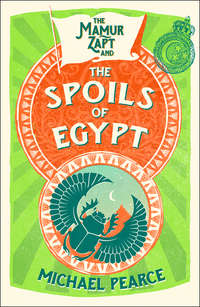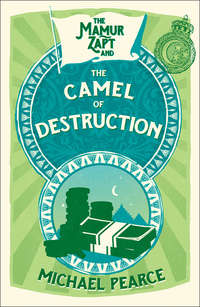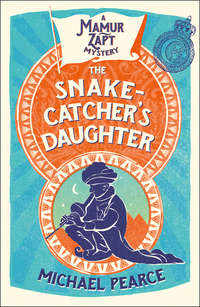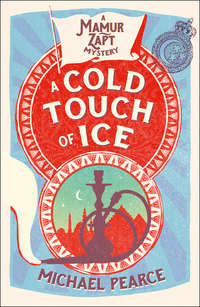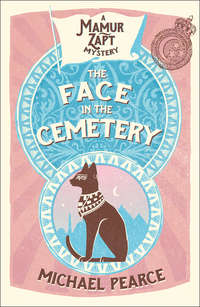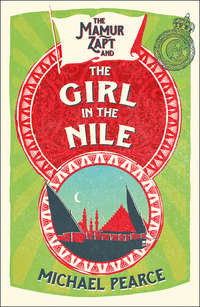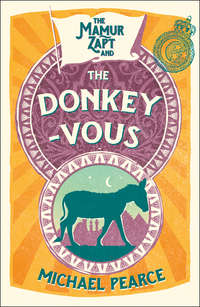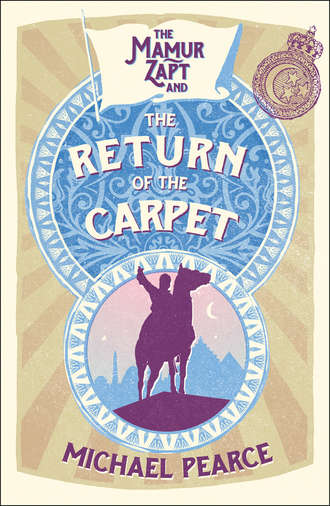
Полная версия
Mamur Zapt and the Return of the Carpet

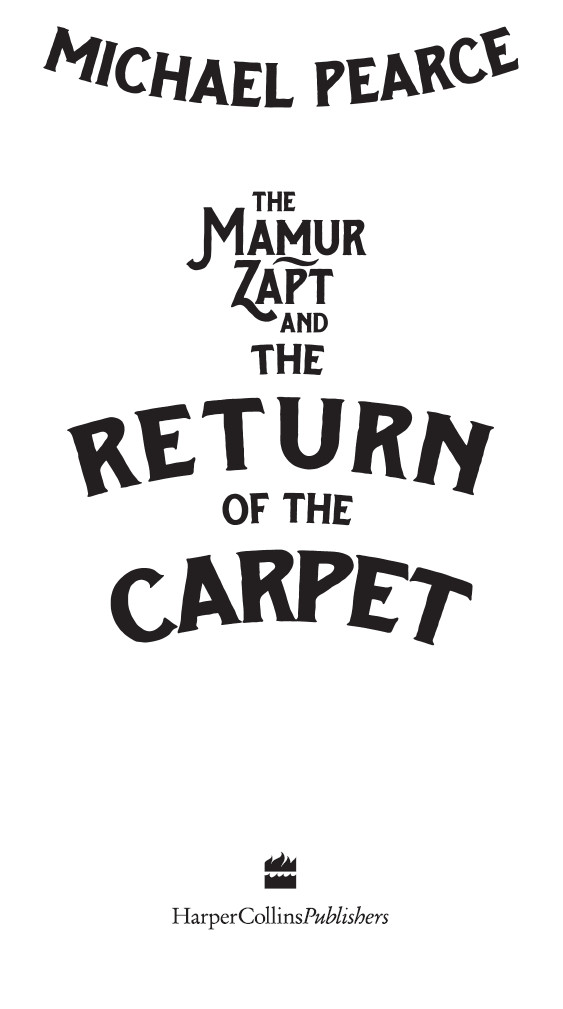

HarperCollinsPublishers Ltd.
1 London Bridge Street
London SE1 9GF
www.harpercollins.co.uk
First published in Great Britain by HarperCollinsPublishers 1988
Copyright © Michael Pearce 1988
Michael Pearce asserts the moral right to be identified as the author of this work.
A catalogue record for this book is available from the British Library
This novel is entirely a work of fiction. The names, characters and incidents portrayed in it are the work of the author’s imagination. Any resemblance to actual persons, living or dead, events or localities is entirely coincidental.
All rights reserved under International and Pan-American Copyright Conventions. By payment of the required fees, you have been granted the non-exclusive, non-transferable right to access and read the text of this ebook on screen. No part of this text may be reproduced, transmitted, down-loaded, decompiled, reverse engineered, or stored in or introduced into any information storage and retrieval system, in any form or by any means, whether electronic or mechanical, now known or hereinafter invented, without the express written permission of HarperCollins ebooks
HarperCollinsPublishers has made every reasonable effort to ensure that any picture content and written content in this ebook has been included or removed in accordance with the contractual and technological constraints in operation at the time of publication
Source ISBN: 9780008259464
Ebook Edition © JULY 2017 ISBN: 9780008257262
Version: 2017-09-04
AUTHOR’S NOTE
Cairo, 1908. The heyday — or is it just past the heyday? — of indirect British rule. Thirty years earlier the profligate Ismail Pasha, Khedive of Egypt, had brought his country to the edge of bankruptcy. The Western powers had stepped in but at a price, and their yoke bore hard. In 1881 Egyptian unrest became open rebellion. To safeguard its financial interests Britain sent in an army, crushed the rebels and restored the Khedive, but from now on the Khedive governed in name only; the real ruler of Egypt was Cromer, the British Agent and Consul-General. A complex apparatus of control was introduced. There were British ‘advisers’ at the top of all the major ministries; the Commander-in-Chief of the Egyptian Army, the Sirdar, was British; so were the Inspector-General of Prisons, the Commandants of the two key police forces of Cairo and Alexandria; and of course the Mamur Zapt, the Head of the Political CID — the Secret Police.
But by 1908 British rule was not as firmly based as it looked. Other powers were growing jealous. France had cultural links with Egypt which dated back to Napoleon and had never forgiven the British for staying on after crushing the Arabi rebellion. Many of Egypt’s criminal procedures were based upon the Code Napoléon and the judicial system in general followed French lines. This meant that investigation and prosecution were the responsibility not of the police but of the Department of Prosecutions of the Ministry of Justice; that is, of the Parquet.
Turkey was also jealous, for Egypt was still constitutionally a province of the Ottoman Empire and the Khedive in theory owed allegiance to the Sultan of Istanbul.
And all the time the underground forces of Egyptian Nationalism were growing in strength and now, in 1908, were just beginning to assert themselves.
Egypt was a country of many potential masters. It had four competing legal systems, three principal languages, and several religions, apart from Islam. It had many, many nationalities. It was a country ripe with ambiguities. A country bright with sunlight and dark with shadows. And in the shadows, among the ambiguities, worked the Mamur Zapt.
In this story I have tried to stay close to fact. The streets are those of Cairo in 1908. The terrorist ‘clubs’ were a feature of the period too. There really was a National newspaper called al Liwa and in 1908 Kitchener’s famous screw-gun battery really did accompany the Return of the Carpet. There was even a Mamur Zapt, although perhaps he was not quite like this one.
CONTENTS
Cover
Title Page
Copyright
Author’s Note
Chapter 1
Chapter 2
Chapter 3
Chapter 4
Chapter 5
Chapter 6
Chapter 7
Chapter 8
Chapter 9
Chapter 10
Chapter 11
Chapter 12
Chapter 13
Keep Reading
About the Author
Also By
About the Publisher
CHAPTER 1
The Mamur Zapt was sitting in his office one morning when his orderly, Yussuf, burst into the room.
‘Come quickly, effendi!’ he said. ‘Bimbashi McPhee wants you at once. At once! Nuri Pasha has been killed!’
This was an exaggeration, for the attempt to assassinate the veteran politician had not succeeded; but Yussuf was not one for pedestrian detail.
However, along the corridor Owen could hear the Assistant Commandant’s voice raised critically, so he put a paperweight on the estimates to prevent them from being blown all over the office by the fan, and rose reluctantly to his feet.
There was an Egyptian in McPhee’s room. He was short and plump and apparently very agitated. McPhee was pouring him a glass of water, which he took with effusive thanks and much mopping of his brow. From behind the silk handkerchief steady brown eyes registered Owen’s arrival.
‘Ah!’ said McPhee, catching sight of Owen as he turned: ‘Captain Cadwallader Owen.’
This, too, was an exaggeration. A romantic Welsh mother had insisted on preserving a remote family connection through the middle name, and Owen had once made the mistake of signing his name in full in McPhee’s presence. The Scotsman, another romantic, had ever afterwards insisted on using both barrels.
‘Do you know Fakhri Bey? No?’
They shook hands.
‘Fakhri Bey was passing when it happened.’
‘I was in an arabeah,’ the Egyptian explained. ‘There was nothing I could do. So I told the driver to drive on and came straight here.’
‘I’m very glad you did,’ said McPhee. ‘We’ll get there right away.’
He picked up his sun helmet.
‘In fact, if you’ll excuse us—’
‘Of course. Of course,’ the other protested.
They set off down the corridor.
‘You don’t want me, do you?’ asked Owen.
Normally the Mamur Zapt, as Head of the Political Branch, did not reckon to concern himself with routine killings.
‘Certainly I do,’ said McPhee over his shoulder.
Owen would have preferred to have carried on with the estimates. They were not especially complex but required a certain attention, and he had set aside the morning for that purpose. His predecessor-but-one had been dismissed for corruption and Owen was sensitive on financial matters.
However, he collected his helmet and joined McPhee at the front of the building. The large square of the Bab el Khalk was empty of transport except for one carriage which Fakhri Bey was just getting into.
He stopped as he saw them.
‘You would be very welcome to share my arabeah,’ he said.
‘May we?’ said McPhee. ‘There doesn’t seem to be any other. It would be taking you back—’
‘Not at all,’ said Fakhri. ‘It would be a pleasure.’
The carriage was one of those with two horses and could take three passengers at a pinch. McPhee and Owen wedged themselves in around Fakhri, and the driver, after a great display of urgency, managed to get the horses going at a steady amble along the broad thoroughfare of the Sharia Mohammed Ali.
‘And now,’ said Owen, ‘perhaps you could tell me exactly what happened where.’
‘Nuri Pasha was shot,’ said Fakhri. ‘It was dreadful. I am so sorry. He was a friend of mine, you know,’ he said, glancing sideways at Owen.
‘A good chap,’ said McPhee supportively, but then McPhee considered many people to be good chaps whom Owen knew to be consummate rogues.
‘And where did all this happen?’ he asked.
‘In the Place de l’Opéra,’ said Fakhri, ‘right in front of my eyes. I could not believe it. I could not believe it.’
‘You actually saw the shooting?’ asked Owen, putting a heavy accent, and not too sceptical a one he hoped, on the word ‘saw’.
‘Yes,’ said Fakhri. ‘Yes, I did.’
He hesitated.
‘Or, at least, I thought I did. I was sure I did.’
Again the sidelong glance at Owen.
‘Now I am not so sure,’ he said.
‘Come,’ said McPhee, sympathetic as usual. ‘You certainly did. You told me all about it.’
‘Yes,’ said Fakhri. ‘I know. And I told you what I thought I saw. But when Captain Car—’ Fakhri mumbled a bit—‘Owen asked me in that sharp way of his and I try to recall detail, what seemed clear suddenly becomes misty.’
‘Well,’ said Owen, brightening, ‘that’s a start anyway.’
The usual problem with Egyptian witnesses was not that they could not recall but that they recalled only too well.
‘I expect you’re used to this,’ said Fakhri. ‘The fallibility of witnesses? My legal friends, without exception, assure me that eyewitnesses are not to be trusted.’
‘It’s a funny business,’ said Owen, ‘what you see and what you don’t see.’
‘I thought I saw. Clearly.’
‘Perhaps you did. Start again. Where were you when all this was happening?’
‘In an arabeah.’
‘Which was—precisely—where?’
‘I had come down the Sharia el Maghrabi. I was just crossing the Place de l’Opéra.’
‘Past the statue?’
The statue of Ibrahim Pasha, the famous Egyptian general who had led his army to within a hundred miles of Istanbul, was a well-known Cairo landmark.
‘Right by the statue. I was about to go down the side of the Ezbekiyeh Gardens.’
‘Fine. And you saw?’
‘I saw Nuri Pasha. I think he had just come out of the Hotel Continental. He walked right out into the Place, looking for his arabeah. I think.’
‘About how far from you?’
‘Twenty metres, perhaps.’
‘Anyway, you recognized him?’
‘Oh yes. He is very distinctive. And I know him well. In fact, that was why I was watching him. To exchange greetings. If he saw me.’
‘Did he see you?’
‘No. He was looking about and I thought he might see me.’
‘Go on.’
‘Well, I was watching him, and then suddenly there was a loud bang, and I saw Nuri Pasha stagger and put his arms up and fall, and I thought: That must have been a shot. Nuri Pasha must have been shot.’
‘The shot,’ said Owen, ‘sounded close to you?’
‘Very close. It made the horses jump. The arabeah swerved. That was how I lost sight of the man.’
‘Tell me about the man.’
Fakhri put his hands to his head.
‘I am sorry,’ he said. ‘It is not clear.’
‘To the left or to the right of Nuri Pasha as you were looking at him?’
‘To the right. But I didn’t really see him. It was just that, as Nuri Pasha fell, in the corner of my eye I thought I saw someone move away.’
‘A blue galabeah?’
‘Yes.’
Fakhri grimaced. ‘Like all the other galabeahs,’ he said.
The long blue gown was the standard garment of the Cairo poor.
They exchanged smiles.
After a while, as Fakhri said nothing more, Owen prompted: ‘And then?’
‘That was all,’ said Fakhri. ‘The arabeah swerved and I lost sight of Nuri Pasha. It was—oh, I suppose three or four minutes before I could look again.’
‘And then there was a crowd ten feet deep round Nuri Pasha and you couldn’t see a thing.’
‘Yes,’ said Fakhri, surprised. ‘That’s right. How did you know?’
The crowd was still thick when they reached the Place de l’Opéra, although the incident must have happened at least half an hour before by the time they got there.
McPhee sprang out of the arabeah and shouldered his way into the throng. A constable appeared from nowhere and joined his efforts to the Bimbashi’s, laying about him with his truncheon. Reluctantly the ranks of the crowd parted and brought McPhee to where a man was lying stretched out in the grit and dust of the square.
‘Make space! Make space!’
McPhee thrust the bystanders apart by main force and held them off.
‘Why!’ he said in disappointed tones, ‘this isn’t Nuri Pasha! Who is this?’
‘It is Ibrahim, sir,’ said a voice from the crowd. ‘He was wounded when Nuri Pasha was shot.’
‘And where is Nuri Pasha?’
‘He was taken into the hotel, sir,’ said the constable.
‘What sort of condition was he in?’
Seeing that the constable did not understand, McPhee changed his question.
‘Was he alive or dead?’
Various voices from the crowd assured him that Nuri Pasha was (a) dead, (b) unhurt, (c) suffering from terrible injuries. Leaving McPhee to sort that out, Owen pushed his way back through the crowd.
To one side of the mêlée two constables were casually talking to a slight, spare Egyptian in a very handsome suit. He looked up as Owen approached.
‘The Mamur Zapt? I did not expect to see you here in an affair of this sort. Mahmoud el Zaki. Parquet.’
The Parquet was the Department of Prosecutions of the Ministry of Justice.
They shook hands.
‘You were here very quickly,’ said Owen.
The Egyptian shrugged his shoulders. ‘Nuri Pasha is an important man,’ he said.
‘How is Nuri Pasha?’
‘Shaken.’
‘That all?’
‘The shot did not touch him. It slightly grazed a lemonade-seller.’
‘No need for me,’ said Owen.
‘No need for me either,’ said Mahmoud. ‘Though I expect I shall get the case now.’
The Parquet, not the police, were responsible for investigation. It was clear that they already had the case in hand. The Ministry of Justice was nearer than the Bab el Khalk and they must have sent a bright young man down as soon as they had heard. There was nothing that Owen could do.
He pushed his way back through the crowd to where the wounded lemonade-seller lay.
‘Are you badly hurt?’
‘I am dying,’ said the man.
There seemed no evidence of any wound.
‘Where is your hurt?’
The man groaned but said nothing.
‘In the bum, effendi,’ a woman said eagerly. ‘Look!’
She lifted the man’s galabeah. The bullet had glanced along the buttock, leaving a livid furrow.
‘He will survive,’ said Owen.
The man was unconvinced.
‘I am dying.’
‘This is not a houris you see,’ said the woman. ‘It is your wife.’
The man groaned again, louder. The crowd guffawed.
‘Take heart, man,’ said Owen. ‘You might have been hit in the front.’
The woman looked up at him mock-demurely. She was a villager and did not wear a veil.
‘What difference would that have made, effendi?’
‘None at all in his case,’ said a voice from the crowd. ‘He has not been with his woman for weeks.’
The wounded man sat up indignantly.
Owen moved away. There seemed very few casualties from the shooting. Whoever it was had thoroughly bungled his job.
McPhee was talking to the man from the Parquet. He signalled to Owen to come over.
‘They think they’ve got the man,’ he said. ‘He was seized as he tried to run away.’
‘Who by?’ said Owen, surprised.
It was very rare for the ordinary populace to intervene in an assault, which, as opposed to an injury or accident, they tended to regard as a private matter.
‘It’s not so surprising,’ said the man from the Parquet. ‘Come and look.’
He led them across the Place and into the Hotel Continental.
In a small storeroom at the back, guarded by a large, though apprehensive, constable, an Arab lay prone on the floor.
He was completely unconscious. Mahmoud turned the head with his foot so that they could see the face. The eyelids rolled back to reveal white, drugged eyes.
McPhee dropped on one knee beside the man, bent over him and sniffed.
‘Don’t really need to,’ he said. ‘Smell it a mile away. Hashish.’
He began searching the man methodically.
‘I expect you’ve already done this,’ he said apologetically.
‘Police job,’ said Mahmoud.
‘And I don’t expect they’ve done it,’ said McPhee.
Most of the ordinary constables were volunteers on a five-year contract and were recruited from those who had finished their conscript service, again five years, with the Egyptian army. They tended to come from the poorer villages and were nearly all illiterate. They were paid three pounds a month.
‘He wasn’t like this when he was caught, surely?’ said Owen, puzzled.
‘Pretty well,’ said Mahmoud. ‘That’s why they caught him. He more or less fell over.’
‘Then how—?’
‘How did he fire the shot?’ Mahmoud shrugged. ‘My guess is he took the hashish to stiffen himself up. He just about managed to fire the shot, and then it caught up with him. That’s why he shot so poorly.’
‘Maybe,’ said Owen.
The other smiled.
‘The other explanation is, of course, that he was drugged up to the hilt, someone else fired the shot—equally poorly—and then put the gun in his hand.’
McPhee looked up. ‘The gun was definitely in his hand at some point.’
He took up the Arab’s limp hand, smelled it, and then offered it to the other two.
‘No, thanks,’ said Owen.
‘Distinct smell of powder.’
‘I’m surprised you can pick it out among the other things.’
McPhee let the hand drop and rose to his feet.
‘Nothing else,’ he said.
‘Did you find the gun?’ Owen asked Mahmoud.
Mahmoud nodded. ‘On the ground,’ he said.
He signed to the constable, who went away and returned a moment later gingerly carrying a large revolver in a fold of dirty white cloth.
‘Standard Service issue, I think,’ said McPhee, ‘but you’ll know better than I.’
He looked at Owen.
‘New model,’ said Owen. ‘Only started being issued here last February. Wonder where he got that?’
‘I’ll have to check,’ said Mahmoud.
‘You’ll have something to go on at any rate,’ said McPhee.
He was always pleased to put the Parquet in its place.
‘More than that,’ said Owen. ‘I think we’ve got a witness for you.’
Mahmoud looked at him inquiringly.
‘Blue galabeah,’ Owen said to McPhee.
He turned to go.
‘Have a word with Fakhri Bey,’ he said as they went.
Afterwards, Owen and McPhee went to the Sporting Club for lunch, and then Owen had a swim. In the summer working hours were from eight-thirty till two. The whole city had a siesta then, from which it did not stir until about six o’clock. Then the shops reopened, the street stall-holders emerged from under their stalls, the open air cafés filled up, and the narrow streets hummed with life until nearly three in the morning.
Owen had got used to the pattern in India and it did not bother him. However, he never found it possible to sleep in the afternoon. Usually he read the papers at the club and then went for a swim in the club pool. The mothers with their children did not come until after four, so he had the pool to himself and could chug up and down practising the new crawl stroke.
Usually, too, he would return to his office about six and work for a couple of hours in the cool of the evening, undisturbed by clerks and orderlies, agents and petitioners. It was a good time for getting things done.
That evening he had intended to get to grips with the estimates, but when he arrived in his office he found a note on his desk from McPhee, asking him to drop along as soon as he got in.
‘Oh! Hullo!’ said McPhee, when he stuck his head round the door. ‘Just as well you’re here. The Old Man wants to see us.’
Garvin, the professional policeman who had relatively recently been appointed Commandant of the Cairo Police, was, if anything, a little younger than McPhee, but McPhee always liked to refer to him in what Owen considered to be a prep-school manner. McPhee had spent twelve years teaching in the Egyptian equivalent of a minor public school before Garvin’s idiosyncratic, and amateur, predecessor had recruited him as Assistant Commandant at the time of the corruption business.
The choice was not, in fact, as eccentric as might appear. McPhee was patently honest, a necessary qualification in the circumstances and one comparatively rare in worldly-wise Cairo; he spoke Arabic fluently, which was a prime prerequisite for the post so far as the British Agent, Cromer, was concerned; and he possessed boundless physical energy, which, although irritating at times, fitted him quite well for some of the tasks a policeman was called on to do.
He was, however, an amateur, and, Owen considered, would not have stood a cat’s chance in hell of getting the job if Garvin had been making the appointment.
The same was probably true of his own appointment as Mamur Zapt, Head of the Political Branch and the Secret Police.
McPhee himself had been responsible for this. The post of Mamur Zapt had become vacant at the time when McPhee, pending Garvin’s arrival, had been appointed Acting-Commandant. The post was considered too sensitive to be left unfilled for long and McPhee had been asked to advise the Minister. Not a professional soldier himself, he had been over-impressed by Owen’s service on the North-West Frontier in India, and Owen’s facility with languages had clinched the matter.
The shrewd, unsentimental Garvin, thought Owen, would have appointed neither of them; neither the eccentric McPhee nor the inexperienced Owen. He would probably have got on better, Owen thought, with the previous Mamur Zapt: the one who knew the underworld of Cairo just a little too well.
Now, when he and McPhee took up their accustomed chairs before the large desk, Owen felt the usual small-boy-about-to-be-disciplined feeling creeping up on him. He guessed that McPhee felt it, too, but they reacted in different ways. McPhee sat up ramrod-straight and barked ‘Yes, sir!’ Owen lolled back in what he suspected was an absurdly exaggerated manner and said nothing. He suspected that Garvin found him far too easy-going.
The suspicion was soon reinforced.
‘Nuri Pasha,’ said Garvin.
‘Nasty shock, sir,’ said McPhee. ‘But he’s recovering. We have the man who did it.’
‘Oh,’ said Garvin.
McPhee described the circumstances.
Garvin did not seem much interested.
‘So that’s all buttoned up,’ McPhee concluded.
‘Buttoned up?’ Garvin regarded him incredulously. ‘You haven’t bloody begun!’
He turned to the Mamur Zapt.
‘Did you get any warning of this?’
‘No.’
‘Why not?’
Owen thought that was an unfair question.
‘We get any number of warnings,’ he began defensively. ‘Three or four a day—’
Garvin cut across him.
‘Did you get one about this? About Nuri Pasha?’
‘Not specifically,’ Owen admitted.
‘Worrying.’
‘Nine-tenths of them are boloney.’
‘The other tenth isn’t,’ said Garvin.
He brooded for a moment.
‘What do you do about those? The ones that aren’t boloney?’
‘We check them all out,’ said Owen. ‘Boloney or no boloney. The ones that look as if they might have something in them we take action over.’


